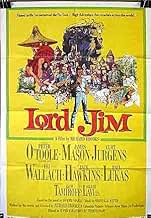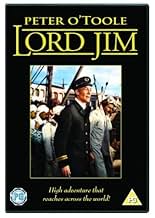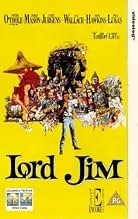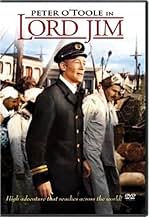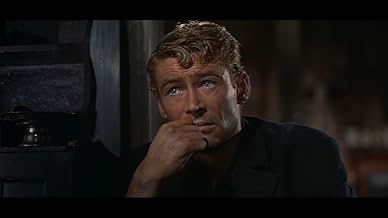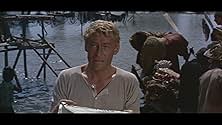IMDb RATING
6.7/10
4.5K
YOUR RATING
After being discredited as a coward, a 19th century seaman lives for only one purpose: to redeem himself.After being discredited as a coward, a 19th century seaman lives for only one purpose: to redeem himself.After being discredited as a coward, a 19th century seaman lives for only one purpose: to redeem himself.
- Nominated for 2 BAFTA Awards
- 2 nominations total
Curd Jürgens
- Cornelius
- (as Curt Jurgens)
Jûzô Itami
- Waris
- (as Ichizo Itami)
Rafiq Anwar
- Moslem Leader
- (as Rafik Anwar)
- Director
- Writers
- All cast & crew
- Production, box office & more at IMDbPro
Featured reviews
Based on the novel, this movie is not only representative of the period piece that Joseph Conrad's story was, but also of movie-making at that time (1965). It's an epic story told in the way that they did back then --sweeping landscapes, exotic locales, hundreds of extras, good performances and many questions regarding philosophical and practical values. At times a bit clunky and unexplained, the movie is a study in movie-making during that era.
It brings up the same issues that Conrad did in his book, sometimes so much so that the dialog feels as though it is dragging. O'Toole's character emotes plenty, despite acting flat for a good portion of the first third. The scene between him and James Mason is the spark of the piece. At 2:34, this movie flounders and drags in the middle. Still, it's a good piece to watch.
It brings up the same issues that Conrad did in his book, sometimes so much so that the dialog feels as though it is dragging. O'Toole's character emotes plenty, despite acting flat for a good portion of the first third. The scene between him and James Mason is the spark of the piece. At 2:34, this movie flounders and drags in the middle. Still, it's a good piece to watch.
It is sometime in the late 19th century, and Jim is an up-and-coming merchant seaman. After rising through the ranks under Captain Marlowe, Jim is injured and stranded in Java. After recovering, he signs on with the first available ship: the SS Patna, bound for Mecca with hundreds of pilgrims. During a storm, the crew abandon it, thinking it will surely sink, and in a moment of weakness; Jim joins them. Back in port, they realise the ship was saved, and Jim's guilt impels him to turn himself in. After a public humiliation at an official inquiry, Jim becomes a drifter in the Asiatic waters; determined to one day restore honour to his good name.
Written and directed by Richard Brooks- and based on Joseph Conrad's novel of the same name- 'Lord Jim' is a grandly photographed adventure that is enjoyable, though doesn't live up to its source material. Despite Brooks' best efforts, he fails to recapture the psychological intrigue and headily atmospheric nature of the novel. His version of the story is more of a straight adventure piece, missing the subtle, profound examinations of guilt and honour that made up the dark heart of Conrad's tale.
This is not to say the film isn't worthwhile, however. Though it culminates with a dull battle sequence, and the pacing is sluggish in places, 'Lord Jim' still engages and entertains. Brooks' dialogue and characterisation is strong, while the portrayal of the colonial attitudes of the time is striking and powerful. Despite the fact that his handling of the novel's themes feels lightweight, the central message about redemption and dignity still comes across; albeit a little watered down.
Furthermore, Freddie Young's immersive colour cinematography gives the film a crisp look and an epic feel. He successfully captures the contrast between the different settings of the film, from the bustling port of Java to the exotic, remote village of Patusan. His utilisation of various camera angles and movements creates dynamic, dramatic scenes, whether it be the stormy night on the Patna, the tense trial of Jim, or the final showdown. Young's consummate work enhances the mood and tone of the film, making it a visually stunning spectacle.
Conversely, Alan Osbiston's ponderous editing lends proceedings a sluggish pace, which is most evident in the latter half of the film. Though just under two and a half hours, 'Lord Jim' feels more protracted than it should have. On the other hand, Bronislaw Kaper's score is atmospheric and stirring, giving life to even the most lethargic of scenes, complementing the fine work of the aforementioned Young.
Also worthy of praise is the cast, led by a pitch-perfect Peter O'Toole. There were- and still are- few actors who could inject the same degree of intensity into their performances as O'Toole did, time and time again. As Jim, he enthralls with his obsessive desire to clear his name of dishonour, and his co-stars prove to be equally impressive. Eli Wallach does typically fine work as the villainous warlord The General, while Curd Jürgens steals every scene he's in as the duplicitous, drunken Cornelious. Moreover, James Mason's turn as the oily, cut-throat bandit Gentleman Brown may make your skin actually crawl; and is the main highlight of the uneven latter half.
In conclusion, Richard Brooks' adaptation of Joseph Conrad's 'Lord Jim' is a mixed-bag if ever there was one. Though Conrad's fascinating tale of guilt, honour and redemption is slightly truncated, it is not totally lost in translation; and the film still packs a narrative punch. Freddie Young's cinematography is captivating, while Bronislaw Kaper's score is stirring and the performances are of a particularly high quality- especially that of star Peter O'Toole. At the end of the day, though it goes through some choppy waters, 'Lord Jim' is still a cruise you should embark on.
Written and directed by Richard Brooks- and based on Joseph Conrad's novel of the same name- 'Lord Jim' is a grandly photographed adventure that is enjoyable, though doesn't live up to its source material. Despite Brooks' best efforts, he fails to recapture the psychological intrigue and headily atmospheric nature of the novel. His version of the story is more of a straight adventure piece, missing the subtle, profound examinations of guilt and honour that made up the dark heart of Conrad's tale.
This is not to say the film isn't worthwhile, however. Though it culminates with a dull battle sequence, and the pacing is sluggish in places, 'Lord Jim' still engages and entertains. Brooks' dialogue and characterisation is strong, while the portrayal of the colonial attitudes of the time is striking and powerful. Despite the fact that his handling of the novel's themes feels lightweight, the central message about redemption and dignity still comes across; albeit a little watered down.
Furthermore, Freddie Young's immersive colour cinematography gives the film a crisp look and an epic feel. He successfully captures the contrast between the different settings of the film, from the bustling port of Java to the exotic, remote village of Patusan. His utilisation of various camera angles and movements creates dynamic, dramatic scenes, whether it be the stormy night on the Patna, the tense trial of Jim, or the final showdown. Young's consummate work enhances the mood and tone of the film, making it a visually stunning spectacle.
Conversely, Alan Osbiston's ponderous editing lends proceedings a sluggish pace, which is most evident in the latter half of the film. Though just under two and a half hours, 'Lord Jim' feels more protracted than it should have. On the other hand, Bronislaw Kaper's score is atmospheric and stirring, giving life to even the most lethargic of scenes, complementing the fine work of the aforementioned Young.
Also worthy of praise is the cast, led by a pitch-perfect Peter O'Toole. There were- and still are- few actors who could inject the same degree of intensity into their performances as O'Toole did, time and time again. As Jim, he enthralls with his obsessive desire to clear his name of dishonour, and his co-stars prove to be equally impressive. Eli Wallach does typically fine work as the villainous warlord The General, while Curd Jürgens steals every scene he's in as the duplicitous, drunken Cornelious. Moreover, James Mason's turn as the oily, cut-throat bandit Gentleman Brown may make your skin actually crawl; and is the main highlight of the uneven latter half.
In conclusion, Richard Brooks' adaptation of Joseph Conrad's 'Lord Jim' is a mixed-bag if ever there was one. Though Conrad's fascinating tale of guilt, honour and redemption is slightly truncated, it is not totally lost in translation; and the film still packs a narrative punch. Freddie Young's cinematography is captivating, while Bronislaw Kaper's score is stirring and the performances are of a particularly high quality- especially that of star Peter O'Toole. At the end of the day, though it goes through some choppy waters, 'Lord Jim' is still a cruise you should embark on.
"Lord Jim" is a film that offers viewers satisfaction on many levels. Although it is set in an exotic locale and has a considerable amount of action, the real story of this movie is its exploration of the human condition. Love, honor, courage, commitment and redemption all come into play as the story moves from the sea to the jungle. It reminds us how a split-second decision can alter dramatically the course of our lives.
"Lord Jim" is a well-paced, engaging film. Peter O'Toole's thought-provoking and moving performance will stick in your mind long after you see this movie. I haven't read the book so I can't speak to the movie's faithfulness to the original text, but it does stand on its own legs as a thoroughly entertaining film. If you like movies such as "Lawrence of Arabia" or "The Sand Pebbles", you will definitely enjoy "Lord Jim." I highly recommend it.
Hopefully, it will become available on DVD soon.
"Lord Jim" is a well-paced, engaging film. Peter O'Toole's thought-provoking and moving performance will stick in your mind long after you see this movie. I haven't read the book so I can't speak to the movie's faithfulness to the original text, but it does stand on its own legs as a thoroughly entertaining film. If you like movies such as "Lawrence of Arabia" or "The Sand Pebbles", you will definitely enjoy "Lord Jim." I highly recommend it.
Hopefully, it will become available on DVD soon.
Moving story of an idealistic seaman forced to deal with his act of cowardice and how he ultimately redeems himself. The film has good action sequences and a moving love story. Performances by Eli Wallach and James Mason are colorful and solid, and there are plenty of Peter O'Toole's trademark "vacant stares". Daliah Lavi is gorgeous and her role more substantive than those of her other films. I love Peter O'Toole's films from this period (Lawrence of Arabia, What's New Pussycat?, Night of the Generals) and this one is as good as most of them. I looked for this film on DVD and finally had to tape it off of AMC (in the good old days before they saturated their programing with commercials). I'd like to see it restored and re-released.
Conrad's novels,like those of Pasternak,are often read more for the mood and the tone than for the plot.In certain cases,the facts are the least important aspect.In my opinion,this is the state of "Lord Jim".The middle part does appear to be similar to a cross between a Tarzan movie,any film revolt against oppression,and "Treasure Island".Oh,but isn't Wallach's General,philosophical and sadistic,evily wise and perceptive,a vast improvement on the original?Sherif Ali was a crook,masquerading as a religious fanatic.The appearance of the pirates,however,enjoyable as it is,really proves to undermine Conrad's intrention.This is a bungled robbery,and Mason's sterling performance shows us a clever and insightful crook manipulating a dupe.In the original,the pirates appear almost as an instrument of fate,allowing Jim to destroy himself.Brown is Jim's unrecognized alter-ego;without acknowledging his own dark impulses,and dealing with them constructively,he(and the rest of us as well) fouls up his career and life.Everything else considered,this is still an enjoyable film,and a great tale of adventure.Watch it,but read the novel when it comes time to do the book report.
Did you know
- TriviaThe crew and cast were joined by Cambodian translator Dith Pran, who was a liaison between Cambodians and the filmmakers and stars. He left the country after the 1975 Communist takeover and his own imprisonment, and his story was told in The Killing Fields (1984).
- GoofsWhen Jim is going up river, one of his companions throws a knife into another's back, but the knife is already in his back as he turns to warn Jim.
- ConnectionsFeatured in My Favorite Year (1982)
Details
- Runtime
- 2h 34m(154 min)
- Aspect ratio
- 2.20 : 1
Contribute to this page
Suggest an edit or add missing content



